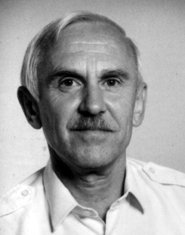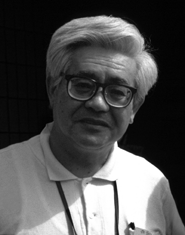
Wolfgang Joost was born in Cobbelsdorf/Anhalt, Germany, on 6 December 1937. Initially, he learned the profession of a shipbuilder but his interest in nature made him engage in many years of continued education. This was often difficult under the circumstances in post-war Germany, and subsequently in the former German Democratic Republic. He became a museologist and a teacher of biology, and worked for years as preparator at the Museum der Natur at Gotha. After he obtained an MSc in Biology he was a scientific assistant at the University of Leipzig, where in 1983 he graduated to Dr. Sci.
His scientific activities started with a faunistic analysis of streams in the Thuringian Forest, followed by emergence trap studies of Thuringian mountain stream insects. W. Joost published many papers on taxonomy and faunistics of Bulgarian Plecoptera, based on extensive fieldwork with Dietrich Braasch, Potsdam. He also produced occasional papers on other faunas, for example, Caucasian and Soviet Central Asian Plecoptera. Academic teaching was very important to him and students loved W. Joost's inspiring and enthusiastic lectures.
Wolfgang Joost also took an intense interest in the history of science and published several books on early scientists and explorers. He particularly loved South America but could visit the subcontinent himself only after Germany was again united. W. Joost had health problems for years, but his sudden death upon return from South American travel was nevertheless unexpected. Wolfgang Joost died on 2 April 2004. He left behind his wife Monika, two daughters and a son. He is missed very much by family, students, friends, and colleagues.
The scientific collections of W. Joost are kept in the Museum der Natur at Gotha. More detailed illustrated accounts of his life were published in Abhandlungen und Berichte des Museums der Natur Gotha 23 (2004), and Entomologische Nachrichten und Berichte 48 (2004), both with complete bibliographies. Perla 23 (2005) lists the Plecoptera papers.
Teizi Kawai (1925–2005)

Teizi Kawai was born on 20 October 1925 in Kyoto, where he lived his entire life. He obtained his Doctorate degree at Kyoto University in 1949. He became a Research Associate at the famous Otsu Hydrobiological Station and later a faculty member of Nara Women's University, where he taught until his retirement. Teizi Kawai passed away on 23 April 2005, leaving behind his wife, a daughter and a son.
Teizi Kawai played an outstanding role in the study of Plecoptera and other aquatic insects in Japan. Numerous papers had already been published and his large monograph of the Japanese Plecoptera (1967) was in print when he came to Schlitz for 12 months to work with J. Illies and myself in 1967–1968. On that occasion, he also established a close friendship with Ian and Nancy McLellan, New Zealand, who visited at the same time. Together, we travelled to the International Symposium on Plecoptera at Abisko. Teizi attended almost every one of the subsequent symposia and for decades served as member of the Permanent Committee for the International Stonefly Symposia. He was himself an excellent host of the 7th International Symposium on Plecoptera in Nara, in 1980. At the 12th International Symposium on Plecoptera in Lausanne (1995) he received the Lifetime Achievement Award of the International Society of Plecopterologists.
However, the interests and activities of Teizi Kawai extended well beyond Plecoptera. For many years he was member of the Editorial Board of Aquatic Insects, was editor of An Illustrated Book on Aquatic Insects in Japan, and, together with K. Tanida edited Aquatic Insects of Japan: Manual with Keys and Illustrations (2005). His specimen collection is kept in the Lake Biwa Museum, his library at Nara Women's University.
Teizi Kawai's enthusiasm for science and his charismatic personality inspired many and attracted numerous new students of aquatic insects. It will take time before the vacuum he left will be refilled; he is missed very much. Obituaries and personal memories of his outstanding personality were published in Perla 24 (2006, with list of his Plecoptera papers), and Biology of Inland Waters 21 (2006; partly in Japanese).
Hans Mendl (1927–2004)

Hans Mendl was born on 5 January 1927 in Pirmasens/Saar, Germany. In 1944 he had to serve in the army and became a prisoner of war. After July 1945 he began to study agriculture at Kempten and Landsberg in Bavaria. In 1953, he became a teacher and head of the Agricultural Professional School at Landsberg. Subsequently, he taught chemistry, biology, and geography at secondary schools, and became Vice Rector at the Kempten Middle School for Girls. The University of Umeå, Sweden awarded him an honorary doctorate in 1979. Because of severe health problems, Hans Mendl had to retire early and undergo heart surgery, which only helped for some time. Hans passed away on 17 June, 2004, leaving his wife Erna and two daughters. He is missed as a dear friend and cheerful colleague.
In accordance with his early profession, Hans' scientific interest was first in botany. Later, he turned to studies of several insect orders. He focused on Plecoptera after he had met Joachim Illies in 1964. From then on, he visited the Schlitz institute many times. He also participated in the 4th International Symposium on Plecoptera at Abisko (1968) and published numerous papers on taxonomy and faunistics of Bavarian Plecoptera, including several new German records and new Alpine species.
In the 1970s, a strong interest in nematocerous Diptera was added and Hans Mendl became a recognised specialist of Diptera: Limoniidae, on which he published numerous papers. His specimen collections were deposited in Museum Koenig, Bonn. Late in the 1980s, a shift of interest to amber fossils, mainly Diptera, occurred, of which he gathered a large collection.
An obituary in Lauterbornia 55 (2005) has Hans' portrait and a complete list of his entomological papers; the obituary in Perla 23 (2005) lists the Plecoptera studies.